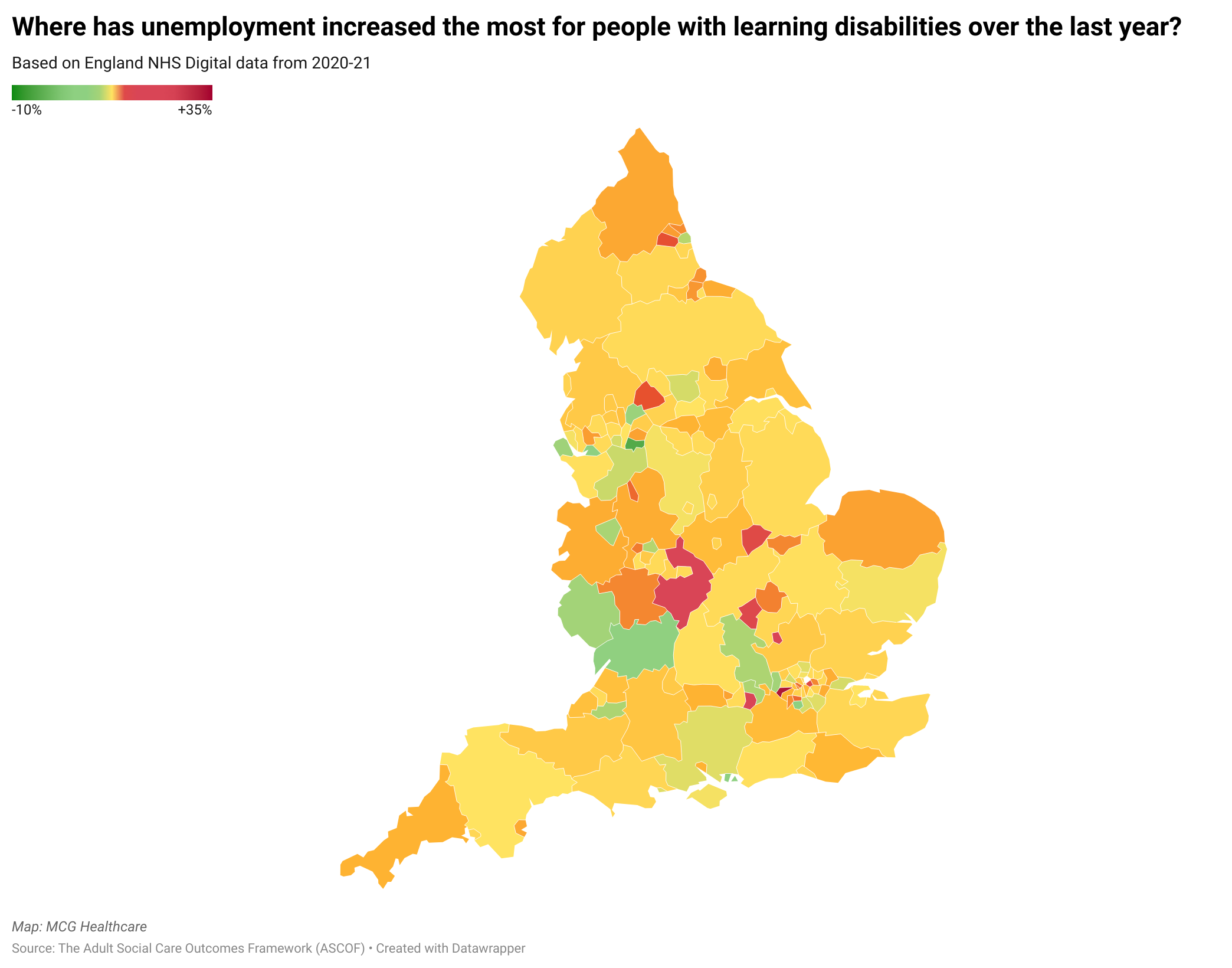The employment gap between those with learning disabilities and the wider population shows no sign of narrowing, as LD employment across England fell by 9% compared to last year.
Some areas of England had zero adults with learning disabilities in paid employment last year, according to the NHS’s latest Adult Social Care Outcomes Framework. Fewer than a quarter of English councils reported an improvement in the LD unemployment rate.
On average, only around one in 20 supported, working-age adults with a learning disability (5%) are now in paid employment in England. Although paid roles provide crucial opportunities for independence and improved confidence for those with a learning disability, figures released in 2021 show that 95% are without paid jobs.
The areas with the biggest year-on-year drops in paid learning disability employment are Hammersmith and Fulham (-100%), Hounslow (-87%), Luton (79%), Merton (69%) and Stoke-on-Trent (-58%). Hammersmith and Fulham has the lowest employment rate, with total unemployment among the 300 plus people with learning disabilities in this area.
The data, collated from NHS Digital by learning disability nurse recruitment specialists MCG Healthcare, highlights the regions where people with learning disabilities need greater assistance following pandemic layoffs. The figures have prompted experts to call for employers and local authorities to evaluate the accessibility of online recruitment processes, home working practices and mental health support.
The UK employment rate is currently estimated at just under 76%, almost 15 times higher than the 5% rate for adults with learning disabilities, bringing the problem into sharp focus.
Ash Higgs, director of MCG Healthcare, says: “Even though the jobs market bounced back well from the pandemic, it undoubtedly left many people unemployed. And many have been left behind as vacancy numbers surged.
“For people with learning disabilities, losing a job – or being unable to find one – can severely dent confidence and deprive individuals of chances to make personal progress. It’s about much more than money.
“Our nurses see, at first hand, just how fulfilled some people with learning disabilities are by their jobs. We aim to offer people as much independence as possible, and work plays a huge part in that, giving people a sense of control and achievement.”
Why have learning disability paid employment rates suffered?
Matt Boyd, founder of neurodiverse recruitment agency Exceptional Individuals, says: “Some of the challenges really show up in the recruitment process. Shifting everything online over the past few years has made things especially difficult for our community, who live with ADHD, dyslexia, dyspraxia, learning differences and disabilities that show when processing information.
“The challenges have definitely become more prominent since the pandemic: there’s a lot more anxiety. People with neuro diversities and learning disabilities are more likely to have mental health problems anyway and the pandemic only added to that. Many are still dealing with the after-effects, which makes it that much harder to find work.
“Having a neurodiverse community within your organisation, they’ll find different solutions to problems, different ways of doing things. But additionally, they’ll represent a section of your customer base, since they’d be the ones buying your products a lot of the time. They can give you the point of view of the 10% of the population who have learning disabilities or neurodivergence, which is an absolutely massive benefit.”
Sheryl Miller, diversity & inclusivity consultant and author of Smashing Stereotypes: How To Get Ahead When You’re the Only in the Room, says:
“For some people with learning disabilities, the increase in home working may be a disadvantage. It potentially leads to the individual having less in-person support and it may limit the ways in which the individual can be coached or instructed on a task. We all have learning preferences, but for someone with a learning disability, they may have less flexibility about how they can receive instructions and information and still effectively carry out a task.
“Home-working, therefore, may limit the ways in which messages can be communicated, unless managers and colleagues are very creative. They may also have a preference for routines and set places, which the pandemic may have disrupted.
“People are more aware of neurodiversity than they were before. With additional training or self-learning, they are starting to become more aware of the additional support that may be required for someone whose neurodiversity creates particular challenges.”
How can you support people with learning disabilities?
Members of the public can donate much-needed funds to charities such as Mencap and Scope, where they can also volunteer their time. If you’re looking for a career helping those with learning disabilities, MCG Healthcare recruits for learning disability nursing roles.
To find out more about people with learning disabilities, Turning Point and the British Institute of Learning Disabilities (BILD) have plenty of information and resources.







